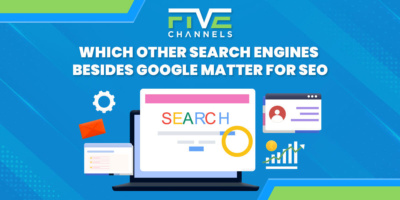Semantic search changed the game for SEO – but not many truly understand what it means for their business. No worries. We’re sharing what you need to know here.
If there is one thing you and your business know more than any other, it’s how quickly the online world can change. Advances in technology take place at an unparalleled rate, and the way consumers search for information has changed dramatically too. Enter the “Semantic Search.”
Ever heard of the term “Semantic Search” before? More importantly, is it in your SEO strategy?
If not, fear not, you’ve come to the right place.
The Semantic Search
The way consumers search for information has changed over the years, and search engines have been quick to not just respond to this change but to lead it too.
Search engines now look to give consumers the perfect search. For you and I, that equates to search results that are as close as possible to what we actually intended.
Google, of course, is not in the business of reading minds. But it is constantly changing and updating its algorithm in order to make a search more relevant.
What does this Mean for Your Business?
Faced with an ever-changing online world, businesses face a stark choice: adapt quickly or fade into oblivion.
The truth is, the semantic search has changed the game for users and businesses alike. You and your business not only need to appreciate the concept of the semantic search, but you must incorporate it into your SEO strategy.
Not sure how to do this? Read on.
Let’s delve into the world of the semantic search and discover the ways that you can use it to your advantage.
What exactly is Semantic Search?
Semantic search looks to make a user’s experience more interactive and conversational, and ultimately, more successful. It is concerned with two core concepts:
- A user’s intent when they search for something online
- The contextual meaning of that search when taken as a whole
In order to provide the best possible results, semantic search uses an array of resources including concept matching and natural language algorithms to personalize a search. It goes beyond the dictionary meaning of a word and takes into account the likely intent behind the search.
Why Should You Care?
Google has long waged a war against spam, and semantic search is a huge asset in this fight.
By using semantic search, Google and other search engines have forged an excellent idea of what words statistically occur together. This makes them much more likely to disqualify irrelevant, poor or inadequate content from their searches.
Search engines are trying to make the world of searching online a more human experience. And, because they provide you with the key in the door to peoples’ lives, it’s super important to make your website pages more accessible.
Your website has simply got to have excellent content with properly structured sentences as a standard. Google wants clear, precise content. It will want to know exactly what the content on your website is and what it represents. And it won’t hang around to give you a chance to explain it.
In this new world, only the best, most targeted and highest quality content will do.
Semantic Search in your SEO Strategy
Semantic search rules the day. And, while the keyword remains important, your days of keyword stuffing are numbered.
Time for a new approach.
Here are some SEO strategies to help you:
1. Create Excellent Content
Creating content that will help your customers is a no-brainer for semantic search optimization, but it’s also essential for your business.
Put the time and effort into your content and you will reap the rewards on numerous fronts. Ask yourself the following questions when creating content:Is it original?
- Does it add value?
- It the writing concise and clear?
- Is the information accurate?
- Does it provide answers?
- Will it provoke thought?
- Will it encourage engagement?
- Remember, the more content you create that people respond to, the more of an authority you become in the minds of the public, and the happier you make the search engines.
2. Structure that Content Clearly
Semantic search puts user intent at the heart of the search process. It is a good idea that you do the same when constructing and structuring content. You must always be asking, “What is the user’s intent when searching for this content?”
Because the search engines are aiming for a more human experience, the more natural the language you use, the better.
Here are some tips on how to structure your content:
- Structure your sentences simply
- Write as naturally as possible and aim for a conversational tone
- Be as natural with your language choice as possible
- Directly answer questions your audience may have
- Use keywords in your content in an organic way – do not stuff
- 3. Use Appropriate and Structured Semantic Markup
It’s important to label the content you provide with semantic markup, paying particular attention to markup vocabulary as set out by Schema.org. This will enable web crawlers to match your content with exactly what search users are looking for.
Marking your content in this way allows search engines direct access to your structured data. It makes for the most optimum matching process because the search engines will understand the information on your pages clearly. They will then be able to match your pages with the users who are searching for them.
4. Use Internal Linking
Internal linking is a great way to enhance the user experience of your customers. As they navigate your site, they also get to click on helpful information within the context of your website. For your SEO strategy, it’s an absolute must.
Why? Because it helps you to become an authority figure in your field. It also strengthens the value of your website – you’re helping your user, but you’re also helping your SEO.
Try to follow these tips for best practice in strategic internal linking:
- Link to more than your contact page – link to great content
- Use links that are natural for the user – take them to where they want to go
- Make sure all your links are highly relevant
- Use a reasonable amount of links but not too much
- Link to authority websites too – external linking is important for your SEO
Semantic Search – You Need to Optimize Now!
The online landscape is forever changing, but one thing will always stay the same: Your need to grow your business.
In order to continue to do that, you simply must implement semantic search into your SEO strategy.
Owner and Chief Marketing Officer, Jason Hall, and his team specialize in creating brand awareness / traffic and lead generation / marketing funnel and conversion optimization, while utilizing the appropriate marketing channels available within your industry. With diverse clients throughout the world, Jason's team is well connected within many industries to assist with your marketing strategies. With no long term contracts and various levels of service, Jason's team will increase the quality of your online traffic, leads, and sales.
About the author...
Located in the heart of the Emerald Coast - Destin, FL, founder and Chief Marketing Officer, Jason Hall, and his team specialize in creating brand awareness / traffic and lead generation / marketing funnel and conversion optimization / and PR campaigns, while utilizing the appropriate marketing channels available within your industry.
With diverse clients throughout the world, Jason's team is well connected within many industries to assist with your marketing strategies. With no long term contracts and various levels of service, Jason's team will increase the quality of your online traffic, leads, and sales.










